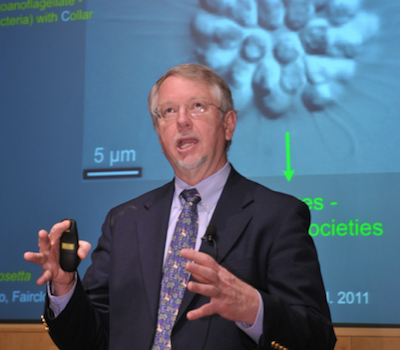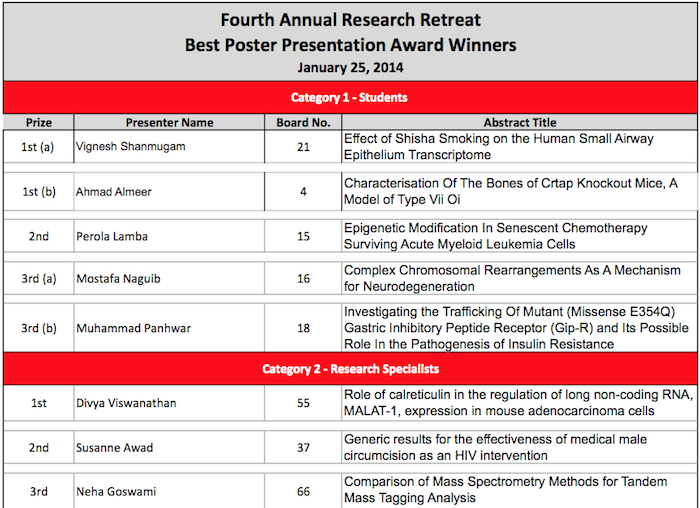WCMC-Q Research Retreat showcases college’s pioneering work
January, 2014
Dr. Khaled Machaca, associate dean of research at WCMC-Q,
said investment in research was beginning to "bear fruit"
The cutting-edge research being conducted at WCMC-Q was showcased at the university’s Fourth Annual Research Retreat.
WCMC-Q faculty and students gathered on Saturday 25 January to give presentations about the research studies being carried out at the university in a wide range of fields, including breast and ovarian cancer, inborn genetic disorders, diabetes and cardiovascular disease.
The annual event is a chance for WCMC-Q investigators to share their findings with their counterparts within the scientific community in Qatar, and for attendees to learn more about the university’s ongoing mission to contribute to the burgeoning research environment in Qatar, and to target health issues most relevant to the regional and Qatari population.
Dr. Khaled Machaca, associate dean of research at WCMC-Q, gave the welcome address at the event. He said: “The significant investments that Qatar Foundation has made in the WCMC-Q Research Program are beginning to bear fruit as illustrated by the presentations and papers from our scientists. Significant impact is obvious in area of critical importance to the health of the Qatari population such as monogenetic disorders, breast cancer, and diabetes. These studies are ushering in the era or precision medicine in Qatar.”
Dr. David Clapham, professor of cardiovascular research and professor of neurobiology at Harvard Medical School, then made the keynote address, followed by presentations from WCMC-Q faculty.
Among many interesting talks and presentations, Dr. Karsten Suhre, professor of physiology and biophysics, described the identification of a salivary biomarker for diabetes identified in the Qatari population. Dr. Lotfi Chouchane, professor of genetic medicine, discussed specific genomics signatures for breast cancer patients in Qatar and the region, while Dr. Alice Aleem summarized ongoing studies aimed at identifying the genetic cause of several monogenetic disorders in Qatari families through genomics studies. Furthermore, Dr. Shahrad Taheri, professor of medicine, spoke about research gaps in the study of diabetes and obesity.

Dr. David Clapham, professor of cardiovascular research and
professor of neurobiology at Harvard Medical School, gave
the keynote address.
The event also featured a total of 92 poster presentations by research specialists, students and postdoctoral fellows relating the findings of projects conducted at the university over the past year.
WCMC-Q currently has 36 active research laboratories investigating diverse areas, ranging from the basic molecular and cellular processes through to translational, clinical and population-based studies. There are now 165 staff and faculty members at WCMC-Q engaged in research, and between July 2012 and June 2013 WCMC-Q faculty contributed to 133 academic publications. In 2013, WCMC-Q research projects won grants from the 6th cycle of Qatar Foundation’s National Priorities Research Program (NPRP) totaling more than $10.3 million.
Dr. Javaid Sheikh, Dean of WCMC-Q, said: “The annual research retreat is a great opportunity for us to see and appreciate the groundbreaking work taking place in our laboratories here at WCMC-Q. Our talented students, research specialists and postdoctoral fellows, supported by members of our faculty, are doing great work and making a fantastic contribution towards our ambition to establish WCMC-Q as a center of excellence in research in the region.
Their hard work and ingenuity, guided by the aspirations of Qatar Vision 2030, have led to many exciting new discoveries, positioning WCMC-Q at the very forefront of medical research and increasing our understanding of serious conditions like cancer, diabetes and cardiovascular disease that affect people in Qatar and all over the world.”
The event closed with the announcement of awards for the most accomplished poster presentations in three categories. First place in the student category was a tie between Ahmad Almeer for his poster about the bone properties of genetically modified mice, and Vignesh Shanmugam for his study of the effect of shisha smoking on the human small airway epithelium transcriptome. First prize in the research specialist category was won by Dr. Divya Viswanathan for a presentation about glandular cancer tumors. First place in the postdoctoral fellow category was scooped by Dr. Rawad Hodeify for his poster on the trafficking of a protein critical for cell function.


